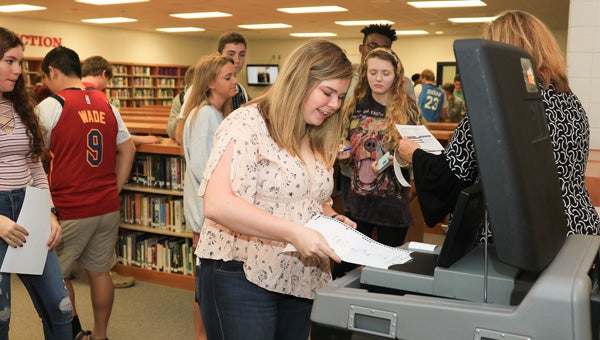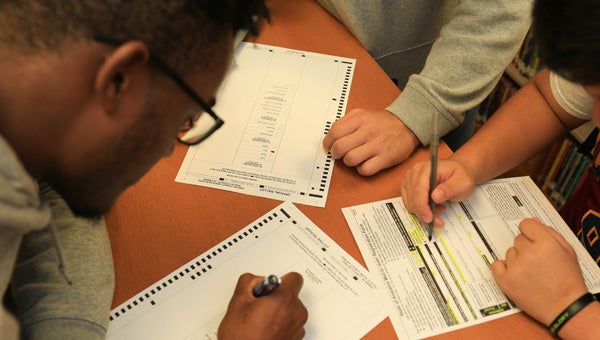Oak Mountain students learn about voting process
Published 1:48 pm Monday, November 6, 2017
NORTH SHELBY – Oak Mountain High School students registered to vote and participated in a mock election on Thursday, Nov. 2, as part of their civics studies.
About 400 OMHS seniors from four classes were split into groups and rotated among different stations in the school’s media center.
“To get all these kids together on one day doing something civically minded is amazing to me,” teacher Susan Schwartz said.
OMHS Principal Kristi Sayers said the effort is an example of teachers’ commitment to helping students learn.
“Our teachers do a great job of bringing in outside learning,” Sayers said. “We know a lot of learning goes on beyond the doors of the school.”
Kim Melton, Shelby County Probate Court chief clerk, and Allison Boyd, mental health program coordinator and legal counsel to the probate judge, talked to students about registering to vote, and those who were close to their 18th birthdays completed the voter registration process online—with many using their smart phones and others using iPads provided by Melton.
“We just find that it helps the students not be quite as nervous when they go to the polls for the first time,” Melton said. “They know what to expect.”
Boyd talked to the students about the need for younger poll workers, and several students expressed interest in helping at the polls for the upcoming special election on Dec. 12 for one of Alabama’s seats in the U.S. Senate.
AP government student Gracie King said her grandmother works at the polls and has encouraged King to do the same.
“I would have to miss a day of school, but I think it would be worth it,” King said.
Boyd also told the students about crossover voting, which occurs when a voter casts a ballot in a primary election for a party with which he or she is not traditionally affiliated.
“We’re telling them they should not be worried about going out to vote,” Boyd said because the Dec. 12 election is not a primary.
After registering, the students were given a ballot with sample questions for a mock election—such as what was the student’s favorite dog breed.
The ballots were printed free of charge by ES&S, the company that prints the ballots for elections.
The students also learned about AutoMARK machines, which allow those with disabilities to vote.
At least one such machine is required by law at each polling place, and one of the machines was brought to OMHS.
The machine scans a blank ballot and allows the voter to make selections through a touch screen, Braille and even a “sip-and-puff” device used by those who do not have control of their arms and legs.
Schwartz said several students who would require the machines to vote were excited about trying it out.
“That’s all they’ve been talking about,” Schwartz said.
At another station, Gwen Brown, peer advocate with Disability Rights and Resources, guided students through voting trivia game.
Questions included which candidates are running in the upcoming election for the U.S. Senate, what forms of identification are acceptable at the polls and even whether voters can take selfies while voting.
AP government student Indy Chery said he was correct on 11 of 13 questions, and that he was grateful for time devoted to learning about the voting process.
“It made the experience a lot easier to go through,” Chery said.
Schwartz said she hopes students are inspired to exercise their right to vote.
“A lot of kids don’t go vote because they don’t know what to expect,” Schwartz said. “Now, all of these students have had a voting experience.”











